
THEORETICAL AND COMPUTATIONAL FLUID DYNAMICS
Scope & Guideline
Pioneering Computational Techniques for Fluid Dynamics.
Introduction
Aims and Scopes
- Theoretical Fluid Dynamics:
The journal publishes research that delves into the fundamental principles of fluid mechanics, exploring topics such as stability analysis, wave dynamics, and the mathematical modeling of complex fluid behaviors. - Computational Methods and Simulations:
A significant emphasis is placed on the development and application of computational techniques, including numerical simulations, reduced-order modeling, and advanced algorithms for analyzing fluid flows. - Interdisciplinary Applications:
Research often intersects with various fields such as aerospace, mechanical engineering, and biomedical applications, addressing challenges in fluid dynamics that impact these domains. - Data-Driven Approaches:
The journal highlights the integration of data-driven methodologies, including machine learning and neural networks, to enhance traditional fluid dynamics studies and improve predictive capabilities. - Experimental Validation:
Many papers incorporate experimental results to validate theoretical models or computational simulations, ensuring that research findings are grounded in practical observations.
Trending and Emerging
- Machine Learning in Fluid Dynamics:
The use of machine learning techniques, such as neural networks and generative adversarial networks, is on the rise, facilitating enhanced modeling, prediction, and analysis of complex fluid behaviors. - Hybrid Computational Techniques:
There is an increasing focus on hybrid methodologies that combine traditional numerical methods with modern computational techniques, allowing for more accurate and efficient simulations of fluid dynamics. - Advanced Turbulence Modeling:
Research into sophisticated turbulence models, including data-driven and multi-scale approaches, is emerging, reflecting the need for better understanding and prediction of turbulent flows. - Fluid-Structure Interactions:
Studies exploring the interactions between fluid flows and structural dynamics are gaining prominence, particularly in applications such as aerospace and biomedical engineering. - Non-Newtonian Fluid Dynamics:
The exploration of non-Newtonian fluids, particularly in complex flows involving viscoelastic and yield stress fluids, is becoming increasingly relevant in various industrial applications.
Declining or Waning
- Classical Fluid Mechanics:
There appears to be a waning interest in traditional topics of fluid mechanics, such as basic laminar flow studies, as researchers increasingly explore more complex and applied scenarios. - Static Fluid Analysis:
Research focusing solely on static fluid conditions or equilibrium states is becoming less frequent, likely due to the growing emphasis on dynamic interactions and transient phenomena. - Simplistic Numerical Models:
The journal has seen a decline in publications utilizing basic numerical methods without incorporating advanced techniques or hybrid approaches, as the field moves towards more sophisticated modeling. - Low Reynolds Number Flow Studies:
Papers concentrated on low Reynolds number flows are appearing less frequently, indicating a shift towards high-speed and turbulent flow dynamics, which are more relevant to current engineering challenges. - Purely Theoretical Approaches:
There is a noticeable decrease in purely theoretical studies that do not incorporate computational or experimental validation, reflecting a trend towards more integrated research methodologies.
Similar Journals

Numerical Analysis and Applications
Advancing computational frontiers through numerical innovation.Numerical Analysis and Applications is a prominent journal dedicated to advancing the field of numerical analysis, published by the Siberian Branch of the Russian Academy of Sciences. Established in 2009, and running through to 2024, this scholarly publication serves as a vital resource for researchers, professionals, and students involved in the mathematical sciences. The journal’s impact is underscored by its classification in the Q3 quartile for numerical analysis within the latest metrics, reflecting its significance in the academic community, although it presently ranks 74 out of 88 in the numerical analysis category, representing a 16th percentile. With a broad scope that encompasses innovative methodologies and applications in numerical techniques, the journal aims to foster interdisciplinary collaboration and share pivotal advancements in numerical theory and practice. Access options may vary, thus offering opportunities for both traditional and contemporary researchers to engage with cutting-edge content that is crucial for driving forward the computational sciences.

Computational and Mathematical Methods
Pioneering Research at the Intersection of Mathematics and MechanicsComputational and Mathematical Methods is a dynamic peer-reviewed journal published by Wiley-Hindawi, focusing on innovative research in the fields of computational mathematics, mechanics, and theory. Since its transition to an Open Access format in 2022, the journal has enhanced its accessibility to researchers and practitioners globally, providing a platform for the dissemination of high-quality studies that contribute to emerging developments in mathematical modeling and computational techniques. Based in the United Kingdom, this journal is committed to fostering collaboration amongst scholars, evidenced by its rankings within Scopus: Q3 in computational mathematics, computational mechanics, and computational theory and mathematics, reflecting its relevance and influence within these critical fields. With an emphasis on interdisciplinary studies, Computational and Mathematical Methods is an essential resource for researchers, professionals, and students seeking to expand their knowledge and apply cutting-edge methodologies to practical challenges.
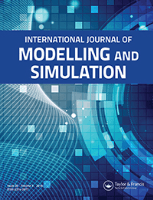
INTERNATIONAL JOURNAL OF MODELLING AND SIMULATION
Pioneering Insights in Engineering and Data AnalysisINTERNATIONAL JOURNAL OF MODELLING AND SIMULATION, published by Taylor & Francis Inc, stands as a leading platform for the dissemination of high-quality research in the fields of modeling and simulation across various engineering disciplines. With an ISSN of 0228-6203 and an E-ISSN of 1925-7082, this esteemed journal has been actively contributing to the academic community since 1996. It enjoys a commendable reputation, ranked in Q2 across numerous categories including Electrical and Electronic Engineering, Engineering (miscellaneous), and Modeling and Simulation, reflecting its vital presence in the academic landscape. The impact factor has not been specified, but its impressive Scopus rankings demonstrate its significance, particularly in General Mathematics and various engineering fields, placing it within the 83rd percentile and above. With a broad scope that encompasses industrial applications and theoretical advancements, the journal aims to foster innovations that drive progress in technology and data analysis. While it is a traditional subscription-based journal, researchers and practitioners are highly encouraged to submit their findings to contribute to the ongoing dialogue in this dynamic field, making it a valuable resource for both established experts and aspiring scholars.

Applied Mathematics-A Journal of Chinese Universities Series B
Innovating the Future of Mathematics Through ResearchApplied Mathematics-A Journal of Chinese Universities Series B is a reputable journal published by ZHEJIANG UNIV PRESS, dedicated to advancing the field of applied mathematics. With an ISSN of 1005-1031 and an E-ISSN of 1993-0445, this journal has consistently provided an insightful platform for researchers to publish innovative studies, theoretical advancements, and practical applications that bridge the gap between mathematics and real-world problems. Operating under the rigorous academic standards characteristic of its category, the journal currently holds a Q4 quartile rank in Applied Mathematics and is positioned at the 30th percentile among its peers in Scopus rankings. Encompassing a publication range from 1993 to 2024, it promises to foster collaboration and knowledge exchange among mathematicians and interdisciplinary scholars, ensuring that high-quality research reaches a global audience. Although the journal follows a traditional access model, its significance in the academic community lies in its commitment to facilitating the dissemination of critical mathematical findings that address complex contemporary issues.
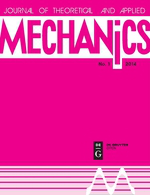
Journal of Theoretical and Applied Mechanics-Bulgaria
Driving Excellence in Modeling and SimulationThe Journal of Theoretical and Applied Mechanics-Bulgaria, with the ISSN 0861-6663 and E-ISSN 1314-8710, is a pivotal publication in the field of mechanics, published by the esteemed BULGARIAN ACAD SCIENCES, INST MECHANICS. Based in Germany, this journal serves as a forum for researchers and practitioners to disseminate groundbreaking theories and applications in Computational Mechanics, Mechanical Engineering, and Modeling and Simulation. As of 2023, it is classified in the Q4 quartile for these categories, reflecting its emergence in the academic landscape, though it has room for growth in visibility and impact. The journal encompasses an ambitious scope aimed at fostering innovation and collaboration among academics, making it an invaluable resource for students and professionals seeking to stay abreast of emerging trends and methodologies in mechanics. Despite its current rank and percentile indicators in Scopus, the journal is committed to enhancing its reach and impact within the community through future editions converging from 2016 to 2024. With no open access options currently available, it emphasizes the importance of institutional subscriptions and academic partnerships to maintain its quality publication standards.
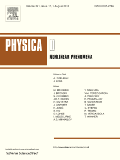
PHYSICA D-NONLINEAR PHENOMENA
Advancing Knowledge in Nonlinear PhenomenaPHYSICA D-NONLINEAR PHENOMENA, published by Elsevier, serves as a leading academic journal at the forefront of the fields of Applied Mathematics, Condensed Matter Physics, Mathematical Physics, and Statistical and Nonlinear Physics. With an impressive track record since its inception in 1980, this journal has maintained a distinguished presence, noted for its Q1 ranking in multiple categories in 2023, showcasing its impact and relevance in the scientific community. The journal's commitment to advancing knowledge is reflected not only in its rigorous peer-reviewed articles but also through its high visibility and accessibility, aiding researchers, professionals, and students in staying abreast of the latest developments in nonlinear phenomena. Located in Amsterdam, Netherlands, PHYSICA D-NONLINEAR PHENOMENA is essential for those seeking to explore innovative research and contribute to groundbreaking discoveries in the realm of nonlinear dynamics.

Physical Review Fluids
Elevating Fluid Mechanics to New HeightsPhysical Review Fluids is an esteemed journal published by the American Physical Society, focusing on the intricate and essential field of fluid dynamics. With an impressive Q1 ranking in categories such as Computational Mechanics, Fluid Flow and Transfer Processes, and Modeling and Simulation, this journal serves as a pivotal resource for researchers and professionals seeking to disseminate high-quality and innovative research findings. The journal's scope encompasses a broad spectrum of topics within fluid mechanics, promoting advancements in theoretical, computational, and experimental methodologies. Although it is not an open-access journal, its publications are critically well-received, underpinned by its strong standing in the Scopus rankings which place it in the top percentiles across various relevant fields. Physical Review Fluids has been a foundational platform for scholars to share their discoveries from 2016 through 2024, making it an indispensable asset in the ongoing evolution of fluid dynamics research.
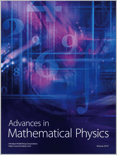
Advances in Mathematical Physics
Shaping the Future of Interdisciplinary ScienceAdvances in Mathematical Physics is a premier open-access journal published by HINDAWI LTD, dedicated to the dissemination of research in the fields of applied mathematics and physics. With its ISSN 1687-9120 and E-ISSN 1687-9139, this journal has been a vital platform for innovative studies since its inception in 2009, fostering a collaborative environment for researchers and professionals alike. The journal features a wide range of topics, including but not limited to mathematical models, computational physics, and interdisciplinary applications, thus attracting a diverse readership. Ranked in the Q3 quartile for both Applied Mathematics and Physics and Astronomy, it serves as a significant resource for academics looking to explore cutting-edge developments and theoretical advancements. With an emphasis on open accessibility, Advances in Mathematical Physics ensures that research findings are readily available to the global academic community, leveling the playing field for emerging scholars and seasoned researchers. By consistently showcasing high-quality manuscripts, the journal contributes substantially to the fields of mathematics and physics, encouraging scholarly dialogue and advancing knowledge across a myriad of applications.
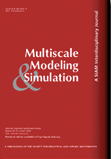
MULTISCALE MODELING & SIMULATION
Exploring the synergy of diverse scientific domains.MULTISCALE MODELING & SIMULATION, published by SIAM PUBLICATIONS, is a premier journal dedicated to advancing the field of multiscale modeling across various domains including chemistry, computer science, ecological modeling, and physics. With an impressive impact factor, this journal consistently ranks in the Q1 category for diverse disciplines, underscoring its outstanding contribution to the scientific community. The journal's scope encompasses innovative simulation techniques and theoretical advancements that aim to bridge the gaps between different scales of physical phenomena, making it an essential resource for researchers, professionals, and students alike. Though it does not currently offer open access, its rigorous peer-review process ensures that only the highest quality research is disseminated. Covering a dynamic range of topics from 2003 through 2024, MULTISCALE MODELING & SIMULATION remains a vital platform for interdisciplinary collaboration and exploration in the rapidly evolving landscapes of science and engineering.

Computational Particle Mechanics
Exploring Dynamic Solutions in Engineering and MathematicsComputational Particle Mechanics, published by SPRINGER INTERNATIONAL PUBLISHING AG, is a leading journal dedicated to advancing knowledge in the interdisciplinary fields of computational mechanics, civil engineering, and fluid dynamics. With an impressive impact factor reflecting its high-quality research publications, this journal maintains a strong presence in the academic community with a Q1 ranking in categories such as Civil and Structural Engineering, Computational Mechanics, and Numerical Analysis as per the latest 2023 evaluations. Researchers and professionals benefit from the journal's commitment to open-access options, promoting wider dissemination of groundbreaking studies. Operating under the Swiss publishing house since 2014, Computational Particle Mechanics aims to foster innovation through the exploration of particle-based methods and simulations, making significant contributions to methodologies within computational mathematics and modeling. As the journal continues to evolve until its converged years end in 2024, it stands as a vital resource for those looking to enhance their expertise in dynamic modeling and simulation techniques.